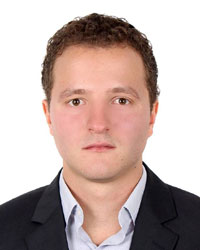The most important thing for a child is to grow up healthy, happy, loved and safe. These ordinary needs are in the dreams of all children deprived of parental care. Their lives are branded with mixed feelings of loss, uncertainty, despair and anger because society views them as different. This oppresses and embitters them, and they sometimes break the law.
There are different reasons for people who have abandoned their children. These vary from financial problems to fear, especially when parents are too young. In this way thousands of children are sent to institutions. They have to grow up faster than their peers who live happily in their families. What happens to them when they really grow up and their adaptation to real life begins outside institutions?
The Step for Bulgaria Foundation is one of the organizations that are committed to the mission of trying to offer solutions to these problems. In an interview for Radio Bulgaria the Foundation’s Chief Operating Officer Yordan Penev tells us more:
 “The main activity of the foundation is coordinating a network of mentors who are engaged individually with young people in need of motivation to develop. We create contact of the respective young person with the mentor who will help him or her find a place in society. It is a matter of discussion. Sometimes we replace a mentor after the young person decides to switch to a different sphere than the originally chosen one. For example after they learn what economy is about they could decide to opt for something else. Well, the good thing is that we have a broad mentor network and we can always respond to such changes.”
“The main activity of the foundation is coordinating a network of mentors who are engaged individually with young people in need of motivation to develop. We create contact of the respective young person with the mentor who will help him or her find a place in society. It is a matter of discussion. Sometimes we replace a mentor after the young person decides to switch to a different sphere than the originally chosen one. For example after they learn what economy is about they could decide to opt for something else. Well, the good thing is that we have a broad mentor network and we can always respond to such changes.”
This is important so that young people can develop their potential. Someone has to believe in them and give them self-confidence for the sake of their success.
“Very often we start working with young people who already have problems with integration into society and are victims of discrimination in school, either because they have no parents, or because of a different ethnicity. What we do with the mentoring program is to socialize them.”
Yordan Penev has graduated from the American College in Sofia and after that has earned a BA in biology in USA. He has volunteered in various humanitarian causes in Bulgaria, USA, Iceland, Britain, Eastern and Southern Africa. He says he has learned a lot from the different places he has been to, but one thing is common among them - every day, no matter where, someone needs help. Some need moral support, others medical treatment, and even though it is in fact a matter of human rights, in some parts of the world it represents an unattainable luxury. There is no greater satisfaction than seeing the smile of a stranger whom you have helped: after having donated clothing or toys to a children's home or having given shelter to an abandoned child. These are small gestures of empathy that make us better. And children without parents badly need love and warmth, and in fact, the full support of the entire society.
English Daniela KonstantinovaAn innovation for the treatment of diabetic foot ulcer using the patient's own tissue and artificial intelligence has been implemented at the University Multi-profile Hospital for Active Treatment-Burgas. Bulgaria is the fourth European country to start..
Over 3.5 million Ukrainians have arrived in or passed through Bulgaria since the beginning of the war. Nearly 200,000 people have found temporary shelter in the country, announced Anna Tertychna from the Ukrainian Embassy in Bulgaria. She..
At the Bulgarian Embassy in London, Prof. Bettany Hughes presented excerpts from the new BBC series - Wonders of Bulgaria. Prof. Bettany Hughes is the author of two episodes of the documentary. Hughes is a historian, writer, author of..
Bulgarians' assessments of the past year in personal terms differ sharply from their views on the situation in the country and the world , according to a..
Bulgarian scientists in Antarctica traditionally celebrate the New Year several times, depending on the presence of foreigners in the base, the head of..

+359 2 9336 661
